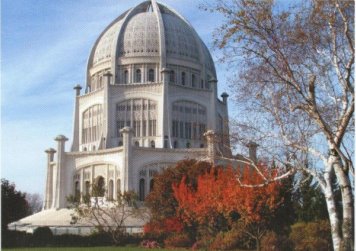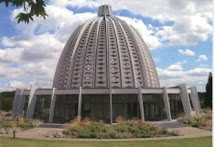166 Year of the Baha'i Era
"It is a New Year; that is to say, the rounding of the cycle of the year. A year is the expression of a cycle of the sun; but now is the begining of a cycle of Reality, a New Cycle, a New Age, a New Century, a New Time and a New Year. Therefor it is very blessed"
Abdu'l Baha
The Baha’i New Year starts on March 21, (the vernal equinox) which marks the first day of spring and the end of the Baha'i Faith’s annual Nineteen Day Fast. Naw Ruz means new day in Persian and it is one of nine holy days on which Baha’is suspend work. They typically celebrate the holy day at sunset on March 20 by gathering for prayer, as the sunset on which the holiday begins comes at the end of the Fast.
Baha'is follow the Badi ("wonderful") calendar, which consists of 19 months of 19 days each (361 days), with the addition of "Intercalary Days" (four in ordinary and five in leap years) between the 18th and 19th months to adjust the calendar to the solar year.
The months are named after the attributes of God. The Baha’i New Year is astronomically fixed and begins with the March equinox (March 21). The Baha’i Era commenced with the year of the Bab’s declaration (1844 A.D.).
Saturday, March 19, 2011
The Baha'i New Year "Naw-Ruz"
Wednesday, March 2, 2011
The Baha'i Fast

The Baha'i year consists of 19 months and the Baha’i month consists of 19 days . Each month named after the attributes of God.The First month’s name is Bahá. It is an Arabic word which means Splendor. The second month is the month of Jalál (Glory), Jamál (Beauty ),…etc . The nineteenth month (‘Alá - Loftiness) is the month of the fast, usually 2–20 March, immediately after the termination of the Intercalary Days (Ayyam Al Ha), and is followed by the feast of Naw-Rúz.
During these nineteen days the fast is observed by abstaining from both food and drink from sunrise to sunset. As the month of the fast ends at the March equinox, the fast always falls in the same season, namely, spring in the Northern, and autumn in the Southern, Hemisphere; never in the extreme heart of summer nor in the extreme cold of winter, when hardship would be likely to result. At that season, moreover, the interval between sunrise and sunset is approximately the same all over the habitable portion of the globe, namely, from about 6 A.M. to 6 P.M.
“O Pen of the Most High! Say: O people of the world! We have enjoined upon you fasting during a brief period, and at its close have designated for you Naw-Rúz as a feast. Thus hath the Day-Star of Utterance shone forth above the horizon of the Book as decreed by Him Who is the Lord of the beginning and the end.”
Baha'u'llah , the Kitáb Al Aqdas-p16
“These are the ordinances of God that have been set down in the Books and Tablets by His Most Exalted Pen. Hold ye fast unto His statutes and commandments, and be not of those who, following their idle fancies and vain imaginings, have clung to the standards fixed by their own selves, and cast behind their backs the standards laid down by God. Abstain from food and drink from sunrise to sundown, and beware lest desire deprive you of this grace that is appointed in the Book.”
Baha'u'llah , the Kitáb Al Aqdas-p17
Fasting is enjoined on all the believers once they attain the age of 15 and until they reach the age of 70 years. But it is not binding on children and invalids, on travelers, or on those who are too old or too weak (including women who are with child or have babes at the breast).
“The traveller, the ailing, those who are with child or giving suck, are not bound by the Fast; they have been exempted by God as a token of His grace. He, verily, is the Almighty, the Most Generous.”
Baha'u'llah , the Kitáb Al Aqdas-p16
The spiritual meaning of Fast:
There is much evidence to show that a periodical fast such as is enjoined by the Bahá’í teachings is beneficial as a measure of physical hygiene, but just as the reality of the Bahá’í fast does not lie in the consumption of physical food, but in the commemoration of God, which is our spiritual food, so the reality of the Bahá’í fast does not consist in abstention from physical food, although that may help in the purification of the body, but in the abstention from the desires and lusts of the flesh, and in severance from all save God.
“Fasting is a symbol. Fasting signifies abstinence from lust. Physical fasting is a symbol of that abstinence, and is a reminder; that is, just as a person abstains from physical appetites, he is to abstain from self-appetites and self-desires. But mere abstention from food has no effect on the spirit. It is only a symbol, a reminder. Otherwise it is of no importance. Fasting for this purpose does not mean entire abstinence from food. The golden rule as to food is, do not take too much or too little. Moderation is necessary. There is a sect in India who practice extreme abstinence, and gradually reduce their food until they exist on almost nothing. But their intelligence suffers. A man is not fit to do service for God with brain or body if he is weakened by lack of food. He cannot see clearly.”
‘Abdu’l-Bahá
Shoghi Effendi indicates that the fasting period is:
“…essentially a period of meditation and prayer, of spiritual recuperation, during which the believer must strive to make the necessary readjustments in his inner life, and to refresh and reinvigorate the spiritual forces latent in his soul. Its significance and purpose are, therefore, fundamentally spiritual in character. Fasting is symbolic, and a reminder of abstinence from selfish and carnal desires.”
The importance of obeying God’s commandments and laws:
“O ye peoples of the world! Know assuredly that My commandments are the lamps of My loving providence among My servants, and the keys of My mercy for My creatures. Thus hath it been sent down from the heaven of the Will of your Lord, the Lord of Revelation. Were any man to taste the sweetness of the words which the lips of the All-Merciful have willed to utter, he would, though the treasures of the earth be in his possession, renounce them one and all, that he might vindicate the truth of even one of His commandments, shining above the Dayspring of His bountiful care and loving-kindness.”
Baha'u'llah , the Kitáb Al Aqdas-p3
"O SON OF BEING! Walk in My statutes for love of Me and deny thyself that which thou desirest if thou seekest My pleasure."
Baha'u'llah , The Arabic Hidden Words – No.38





